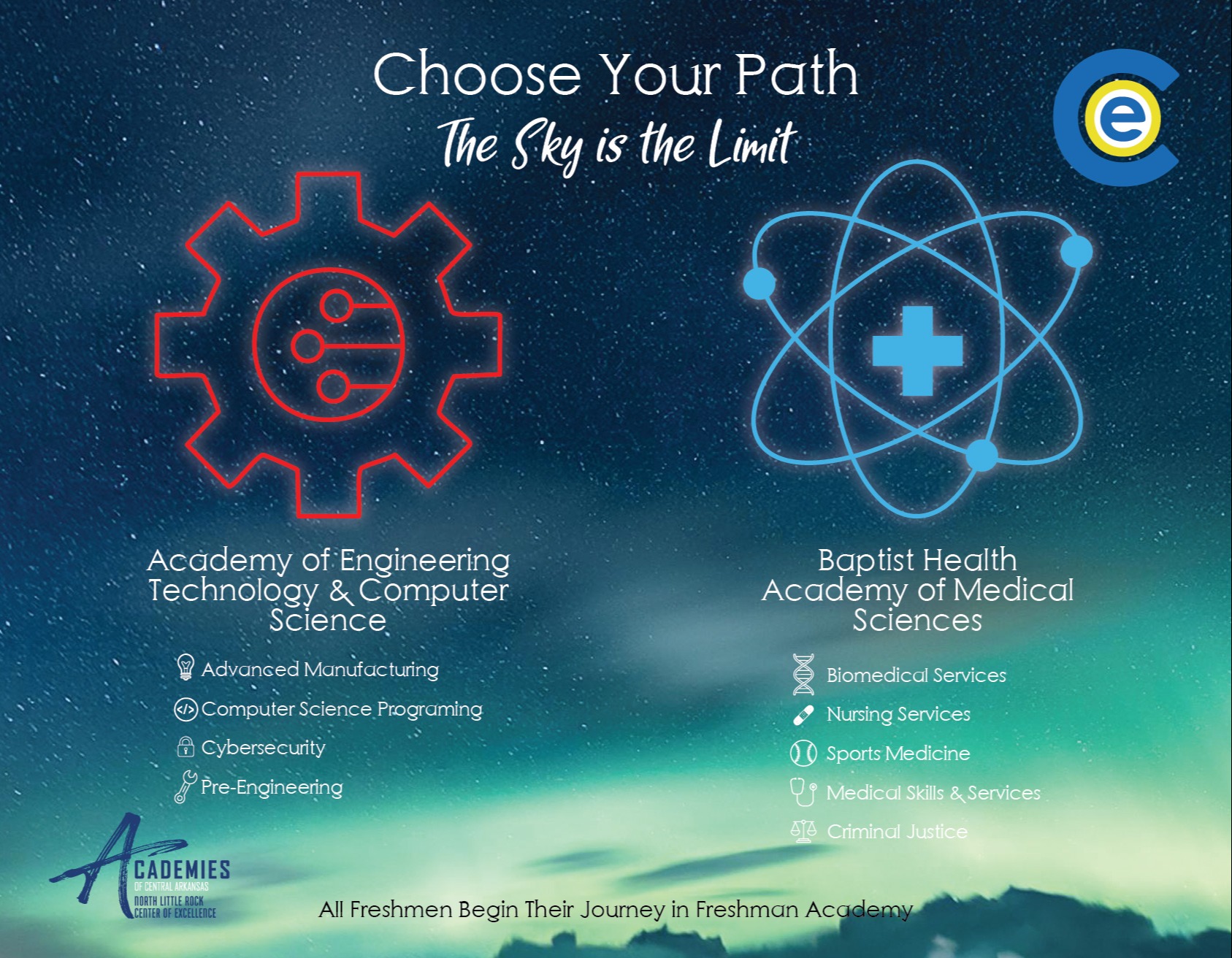CAREER ACADEMIES

Beginning the 2023-2024 school year, students in the Class of 2026 and thereafter who are enrolled in the Center of Excellence will be assigned to one of the following career academies: Academy of Health Sciences or Academy of Engineering Technology.
These career academies are a part of the Ford Next Generation Learning (NGL) model, launched by the Little Rock Chamber of Commerce back in 2019. This model strives to transform learning outcomes for students by bringing together educators, employers, and community leaders to ensure students are future ready to meet the local and national workforce needs that exist.
Please click on this link for more information about career academies.
ACADEMY OF ENGINEERING TECHNOLOGY & COMPUTER SCIENCE
Academy Mission: The academy of Engineering Technology and computer science helps students develop the problem solving skills necessary to address real-
world problems. Students focus on the application of visualization processes and tools provided by modern, state-of-the-art computer hardware and software. student often use computer-aided design (CAD) software, various programming languages, and advanced manufacturing skills to plan, develop and produce prototypes of new ideas.
Advanced Manufacturing
The Advanced Manufacturing pathway will introduce students to academic and technical skills relating to manufacturing technology. Students will learn safety protocol and procedures, identification and uses of hand tools, proper operational techniques of manual and electrical machines, knowledge of machining and manufacturing processes and different types of production processes. Students will be able to demonstrate knowledge of computer and technology skills related to computer-aid design. Students in this pathway will have the opportunity to graduate with career industry certifications.
Computer Science Programming
The Computer Science Programming pathway will focus on programming/coding aspects of computer science. Students with a computer science background will be needed in every sector of our computerized world from computer hardware to software, from networking to troubleshooting. Students will develop knowledge in computational thinking and problem solving, data and information, algorithms and programs, computers and communications, and community, global, and ethical impacts. Students will learn how to analyze increasingly complex problems and develop efficient solutions to those problems in a collaborative learning environment. Multiple technologies will be engaged in order to equip students with fluency that will enable them to adapt to the constantly-changing field of computer science.
Cybersecurity
The Cybersecurity pathway will focus on IT fundamentals while learning foundational cybersecurity topics including, digital citizenship, cyber hygiene, the basics of cryptography, software security, networking, basic programming, and basic system administration. The students will demonstrate understanding of digital citizenship, cyber hygiene, the basics of cryptography, software security, networking, basic programming, and basic system administration.
Pre-Engineering
The engineering pathway introduces students to a range of engineering sills, principles and concepts. Initially, through the application of the engineering design process, students use math, science, and engineering standards to solve problems. Students explore brainstorming techniques, collaborate with teammates, use 3-D modeling software, and document their work using recognized engineering best practices. Then, students are introduced and immersed into a broad range of engineering topics, including thermodynamics, mechanisms, statics, and automation. Ultimately, students apply the skills and engineering principles learned to a problem of their choice, presenting their solution to a panel of engineers and community stakeholders.
ACADEMY OF HEALTH SCIENCES
Academy Mission: The Baptist health Academy of Health & Human Services and Law provides a rigorous and hands-on approach to education in the healthcare industry or for those interested in learning about law enforcement. In this
academy, students can complete a variety of courses exploring different avenues of healthcare or they can explore and learn about the criminal justice system. Not only will this prepare students for college, but we also provide career readiness by offering industry certifications in multiple fields.
Biomedical Services
In the Biomedical Sciences pathway, students are empowered to explore some of today’s most pressing medical challenges. Through activities that connect learning to life, students step into the roles of biomedical science professionals and investigate topics including human physiology, medicine, genetics, microbiology, and public health. Students work together in teams to find unique solutions, and in the process, learn skills that are in-demand and transferable like critical thinking and communication. This pathway is designed to allow students to take on real-world medical and science challenges while working with the same tools used by professionals in hospitals and laboratories. Students will engage in hands-on activities and work together to find solutions to problems.
Nursing Services
The Nursing Services pathway prepares students to pursue careers or further education and training in nursing directly out of high school. Students will study anatomy and physiology, patient care, medical equipment usage, medical terminology and medical office skills. This program of study is designed to equip students with knowledge and skills that could lead to a range of nursing careers such as home health aide, certified nurse assistant, medical assistant, licensed practical nurse and registered nurse.
Pharmacy Technician
The Pharmacy Technician pathway focuses training the students to perform daily tasks under the guidance of a pharmacist. These tasks include filling and labeling prescriptions, interacting with customers to answer questions and giving them their prescriptions. The skills taught are broad and transferable. They stress understanding and demonstration of the following elements of the healthcare industry: planning, management, finance, technical and production skills, underlying principles of technology, labor issues, community issues and health, safety, and environmental issues.
Sport Medicine
The Sports Medicine pathway is appropriate for students who wish to pursue a career in healthcare with a focus on sports related injuries. Studies will focus on the musculoskeletal system, injury assessment, injury prevention, and rehabilitation. This program could lead to careers in Sports Medicine and Rehabilitative Services. This pathway will enable students to receive initial exposure to therapeutic services skills and attitudes applicable to the healthcare industry.
Medical Skills & Services
The Medical Skills and Services pathway is for students interested in learning about emergency medicine. First Responders include EMTs, fire fighters, police, and paramedics. They provide a service in an environment that requires special skills and knowledge. Individual orientation to the specific systems and services with which the First Responder will be affiliated is necessary to achieve a full level of competency within a specific organization. Students will graduate with industry recognized certifications. This pathway can lead to jobs in EMS, law enforcement, and fire fighting.
Criminal Justice
The Criminal Justice pathway will prepare students to function as a law enforcement officer. The course provides the historical background of the agencies that compose the criminal justice system. It focuses on the development of justice and law, crime and punishment, the administration of laws, the agencies’ functions, career orientation, and public relations. Next, it will prepare students to perform the duties of police. It will conclude with the application and interpretation of criminal statutes, Arkansas Criminal Code and the laws of evidence as they apply specifically to criminal justice.
